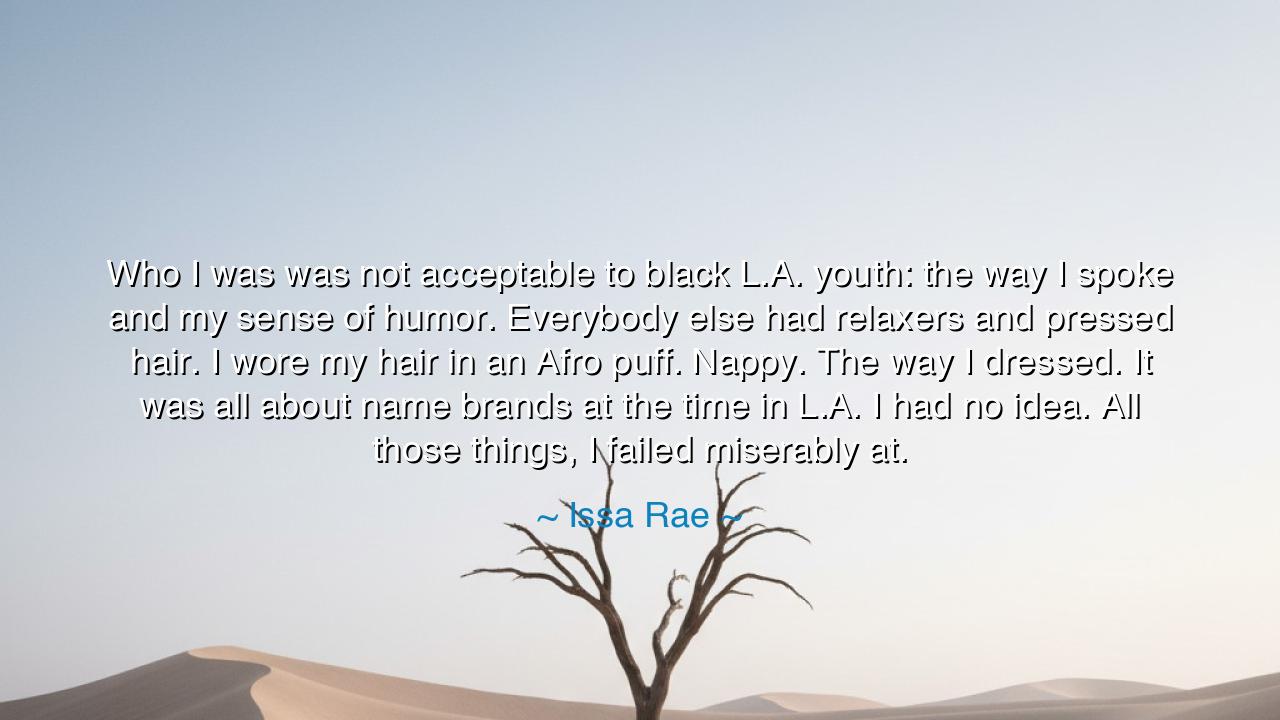
Who I was was not acceptable to black L.A. youth: the way I spoke
Who I was was not acceptable to black L.A. youth: the way I spoke and my sense of humor. Everybody else had relaxers and pressed hair. I wore my hair in an Afro puff. Nappy. The way I dressed. It was all about name brands at the time in L.A. I had no idea. All those things, I failed miserably at.






Listen, O Children of the Earth, to the words of Issa Rae, a woman who, in her youth, found herself standing at the crossroads of identity and acceptance. She spoke thus: "Who I was was not acceptable to black L.A. youth: the way I spoke and my sense of humor. Everybody else had relaxers and pressed hair. I wore my hair in an Afro puff. Nappy. The way I dressed. It was all about name brands at the time in L.A. I had no idea. All those things, I failed miserably at." These words strike with the weight of a truth so deep, so universal, that it calls to us across time and space. For in them, we see the battle for identity, the pain of nonconformity, and the quest for acceptance in a world that judges by surface alone.
In the heart of Issa's reflection, we discover the great lesson of individuality and the strife of being true to oneself in a world that demands conformity. She describes a time when her very being—the way she spoke, the way she wore her hair—set her apart from her peers. In Los Angeles, a city of glamour and constant reinvention, her Afro puff, her nappy hair, her rejection of the name brands that consumed the masses—these were all signs of her difference, and yet it was that very difference that she struggled to reconcile with the need for belonging. She was, in the eyes of others, a misfit, a person whose authenticity did not align with the expectations of the world around her.
This journey of self-acceptance is not a new tale, nor is it unique to Issa Rae alone. Many, throughout history, have battled against the pressure to mold themselves into shapes not their own. Consider the life of Frederick Douglass, who, in his early years, was taught to hate his own identity—his skin, his speech, his heritage. But as he grew, so did his sense of self. He learned to embrace his blackness, to speak with the power and eloquence that lay within his soul, despite the world’s harsh judgment. He stood tall, unyielding, in the face of the societal pressures that sought to strip him of his dignity. Douglass, like Issa Rae, had to come to the realization that self-worth cannot be found in the approval of others; it must be found in the acceptance of who you truly are.
Issa’s words remind us of the ancient struggle for authenticity. Every culture, every age, every generation has faced this trial—the conflict between personal truth and external approval. In ancient times, warriors like Achilles stood firm in their beliefs and fought for what was right, even when it meant defying the norms of their society. And in the world of the arts, Leonardo da Vinci defied the conventions of his time, forging a path that was uniquely his, despite the doubts of his contemporaries. These men, like Issa Rae, understood the sacred nature of being true to oneself, even when it meant walking a path that others did not understand.
Let us consider the lesson at the heart of Issa’s words, O Children of the Earth: the road to self-acceptance is often a lonely one, fraught with misunderstandings and judgments. But it is in the embrace of one’s true nature that we find strength and power. Issa Rae, by wearing her Afro puff proudly, by rejecting the superficial trappings of name brands, was not just expressing her individuality—she was reclaiming her identity. In doing so, she opened the door to her own creativity, which would later birth the powerful works that would touch the hearts of many. She teaches us that the most profound acts of self-expression often come from the courage to stand apart from the crowd.
And so, what must we learn from this? That authenticity is not merely a choice, but a necessity. In a world that often demands we wear masks, dress in ways that reflect the trends of the moment, and speak in ways that please the masses, we must remember that the most precious thing we possess is our true self. Embrace your differences, for it is in those very differences that you will find your power. Just as Issa Rae found her voice in her nappy hair and unbranded clothes, so too must we find the courage to stand firm in the face of the world’s expectations and to celebrate what makes us unique.
Let us also remember the importance of cultivating self-compassion on this journey. The road to authenticity is not always easy; it is often fraught with pain and failure. There will be moments, as Issa Rae experienced, when we feel the sting of rejection, when we feel as though we have failed to meet the world’s standards. But it is in those moments of failure that we must look inward and ask, "Am I true to myself? Am I honoring who I truly am?" And if the answer is yes, then know that you have succeeded, for the true measure of a person is not in the approval of others, but in the peace found in knowing that your heart remains unbroken and whole.






AAdministratorAdministrator
Welcome, honored guests. Please leave a comment, we will respond soon